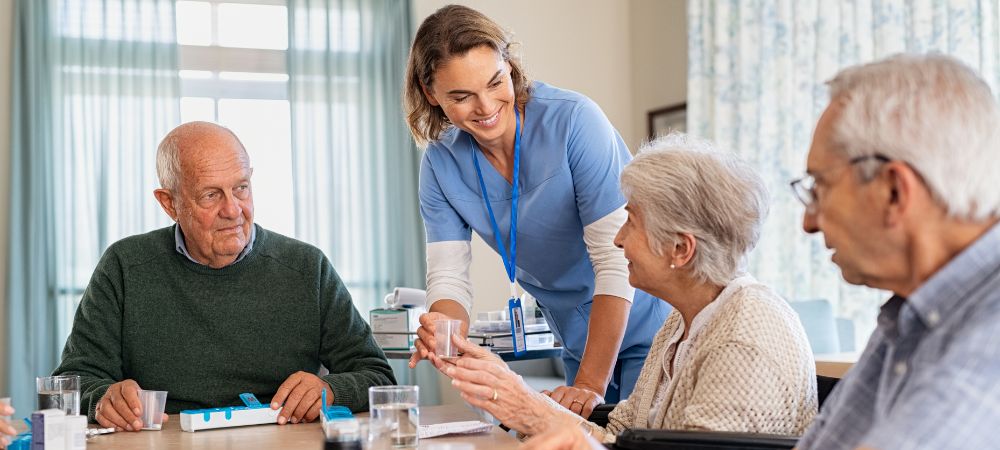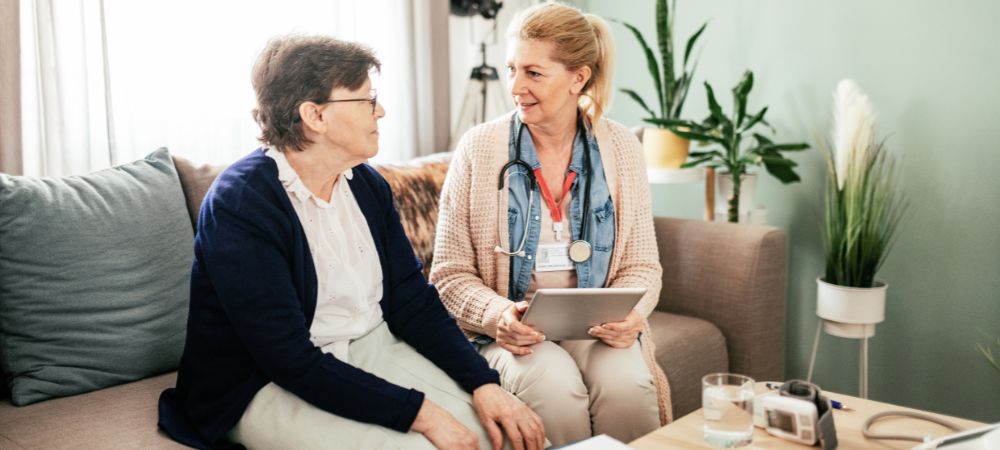Recently updated on April 22nd, 2025 at 08:35 am
Managing pain for elderly adults can be challenging. As they age, many experience chronic pain, which can significantly impact their quality of life. Managing this pain is necessary as it helps them to maintain their independence and engage in daily activities. Effective pain management in the elderly requires a unique approach that addresses their physiological needs.
Need help with pain management in the elderly? Loving Homecare is here to help. They offer compassionate home care services, so your loved ones get the care they need without leaving the comfort of their home.
30 Seconds Summary
- Older adults often live with long-lasting pain that affects how they feel, sleep, and enjoy life. It’s important to manage this pain to fit their health needs. Since many seniors have more than one health problem, their care should be personalized.
- Medicine can help, but it needs to be chosen carefully. Some strong pain medicines, like opioids or ketamine, can cause side effects, so doctors often try safer options first.
- Other help methods include gentle exercise, talking to a therapist, or using heat and cold packs. Eating healthy foods can also reduce pain.
- Getting care at home makes life easier and safer for seniors. It also helps prevent falls and gives emotional support, especially near the end of life. Loving Homecare offers services to keep your loved one comfortable and supported.
Understanding Chronic Pain in Seniors
Chronic pain in seniors is often described as a pain that doesn’t go away, much like a constant ache. It can be caused by arthritis, nerve issues, or even past surgeries. This pain can affect the body, mood, sleep, and social life. Seniors with chronic pain may feel more isolated, anxious, or depressed because pain makes it hard to enjoy life as they once did.
It’s important to understand that pain for older adults is often more complicated because they may have multiple health problems. For instance, diabetes can cause nerve pain, and heart disease may limit the treatments available. When treating chronic pain, it’s necessary to consider all these factors and how they interact.
The Impact of Chronic Pain on Quality of Life
Chronic pain can severely limit seniors’ ability to do things they enjoy, like gardening, walking, or even participating in family events. This loss of independence is frustrating and can lead to emotional issues like depression and anxiety. Moreover, pain often leads to poor sleep, which only worsens things. It’s a vicious cycle: pain affects sleep, leading to more fatigue, which makes the pain feel even stronger.
Managing chronic pain is to ease discomfort and help seniors regain their independence and joy.
Challenges in Pain Management for the Elderly
Pain management for the elderly is difficult because they often have many health problems. Their bodies change as they age, meaning they may feel pain differently or have trouble processing medicines. Some people also have memory problems, making taking medicine correctly harder.
For example, opioids, which are strong painkillers, may not be safe for older adults because they can cause serious side effects like confusion or slow breathing. This makes it important to choose the right kind of medicine.
Is arthritis causing discomfort for your loved one? See how our arthritis care services at Loving Homecare can provide relief.
Pain Management and the Elderly
Doctors who treat pain in older adults follow special pain management guidelines for the elderly. These guidelines recommend using paracetamol (also called acetaminophen) first because it is safe and works well for mild pain. But if the pain is worse, stronger medicines like opioids or ketamine may be needed. However, these stronger medicines have risks, so they should be used carefully.
Doctors also recommend using other treatments, like physical therapy or psychological support, to help with pain without using too many medicines.
Need help with in-home care services? Loving Homecare offers professional care for elderly patients at home.
Pain Management for Seniors
Pain management for seniors is different from that of younger people. Seniors often have long-term health problems like arthritis or diabetes that cause pain. Managing this pain means doctors need to think about both the pain and the person’s other health problems.
Sometimes, seniors can find relief without medicine. For example, they can do special exercises with a physical therapist or use heat or cold packs to reduce pain. Talking to a therapist can also help seniors feel better emotionally and deal with the pain better.
Looking for reliable diabetes care for seniors? Visit Loving Homecare to get the best care for diabetes management.
Medicine for Pain Relief

Medicine is often needed to treat pain in older adults. But it’s important to pick the right medicine because older adults may react to it differently than younger people.
-
Opioids and Their Risks
Opioids are very strong pain medicines, but they have risks for older adults. They can cause side effects like confusion, sleepiness, or difficulty breathing. For these reasons, opioids should only be used for short periods or in emergencies.
Doctors often start with safer medicines, like acetaminophen, and use opioids only if needed. Monitoring and careful use can help prevent dangerous side effects.
-
The Potential of Ketamine for Pain Relief
A new medicine, ketamine, is sometimes used to help with pain. Ketamine is not an opioid, but it can still help with pain, especially if other painkillers don’t work. It’s important to know that ketamine can have side effects, such as dizziness or confusion, which may be more common in older adults. But it can be a good choice if someone cannot take opioids.
Falls can cause significant pain and injury to elderly individuals. Loving Homecare provides fall prevention services to help reduce the risk of falls and manage pain effectively.
Chronic Pain Management Techniques for Seniors
There are several approaches to managing chronic pain, and the best results often come from a combination of methods. Here are some effective strategies:
Pharmacological Approaches (Medications)
Medication plays a major role in managing chronic pain for seniors. However, it’s essential to use it carefully, as older adults may have other health conditions that can make certain drugs less safe. Here are some common types of medication used in chronic pain management:
- NSAIDs (e.g., Ibuprofen): These help with inflammation and pain but can cause stomach problems if used long-term.
- Acetaminophen (e.g., Tylenol): A good option for mild to moderate pain, but overuse can damage the liver.
- Opioids (e.g., Morphine, Oxycodone): Strong painkillers for severe pain. However, they carry risks of addiction, dizziness, and constipation, so they need to be used cautiously.
- Topical treatments (e.g., Capsaicin cream) relieve specific areas without causing systemic side effects.
Medications should always be prescribed and monitored by a healthcare provider to ensure their safety and effectiveness for each individual.
Physical Therapy and Exercise
Physical therapy helps strengthen muscles and improve mobility, which can reduce pain over time. Gentle exercises like walking, stretching, and strength training can help seniors improve their flexibility, reduce stiffness, and make movement easier. Tai chi and yoga are excellent low-impact exercises that relieve pain while improving balance and coordination.
Cognitive Behavioral Therapy (CBT)
CBT is a type of therapy that helps people change how they think about pain and how they respond to it. It teaches seniors to manage pain more effectively by shifting their focus away from the pain and learning relaxation techniques. CBT can be particularly helpful for those who feel stressed or anxious about their pain.
Mindfulness and Relaxation Techniques
Mindfulness, deep breathing exercises, and guided relaxation can help seniors reduce the emotional toll that chronic pain takes on them. These techniques can lower stress, decrease muscle tension, and improve mental health. Meditation and progressive muscle relaxation are great ways to help seniors manage pain gently and non-invasively.
For more about managing pain through support, learn more about Loving Home Care’s Palliative Care services.
Other Techniques for Pain Management in The Elderly
Nutrition and Diet
What seniors eat can play a significant role in managing chronic pain. Certain foods have anti-inflammatory properties that can help reduce pain and swelling. These include:
- Colorful fruits and vegetables (like berries, tomatoes, and leafy greens)
- Fatty fish (like salmon and mackerel, which are rich in omega-3 fatty acids)
- Nuts and seeds (which contain healthy fats and antioxidants)
Conversely, foods high in sugar and processed can increase inflammation, worsening pain. Encouraging seniors to maintain a balanced, anti-inflammatory diet is important in managing chronic pain.
Traditional Treatments
In addition to traditional treatments, several alternative therapies can help with pain relief:
- Acupuncture: Involves inserting thin needles into specific points on the body to stimulate energy flow and reduce pain.
- Massage therapy: Helps relax tense muscles and improves circulation, relieving pain.
- Heat and cold therapy: Applying heat or cold to the affected areas can help reduce inflammation and numb the pain.
These techniques can offer relief when combined with other pain management strategies.
Pain Management and Mental Health Support
 Pain doesn’t just affect the body; it can also take a toll on mental health. Seniors with chronic pain are at a higher risk of depression and anxiety, which can make pain feel worse. Therefore, alongside pain management, it’s crucial to provide mental health support, such as therapy, counseling, or support groups. Learning stress-management techniques and having access to emotional support can improve a senior’s ability to cope with their pain.
Pain doesn’t just affect the body; it can also take a toll on mental health. Seniors with chronic pain are at a higher risk of depression and anxiety, which can make pain feel worse. Therefore, alongside pain management, it’s crucial to provide mental health support, such as therapy, counseling, or support groups. Learning stress-management techniques and having access to emotional support can improve a senior’s ability to cope with their pain.
Loving Homecare offers gentle end-of-life care to manage pain and bring peace. We also provide emotional support to help your family feel comforted and cared for.
Preventing Falls and Accidents
One of the biggest risks of pain in older adults is the chance of falls. Pain can make it harder for seniors to move, and they might get hurt if they fall. This is why fall prevention is so important. Making the home safer, using special tools like walkers, and protecting the environment from hazards can help prevent falls.
Loving Home Care’s Fall Prevention services can help make the home safer for seniors.
The Importance of In-Home Care Services
Sometimes, seniors find it best to manage their pain in their own homes. In-home care services can help them manage pain while staying safe and comfortable. Caregivers can give medicine, help with exercises, and ensure the home is safe.
Having someone there to care for them means seniors don’t have to worry about remembering their medicine or doing tasks that might cause more pain. It also gives family members peace of mind.
You can learn more about our In-Home Care Services here.
Over to You
Managing pain in older adults is important to keeping them healthy and happy. The right medicine and other treatments, like physical therapy, can help. Pain management in elderly patients should be personalized to meet their needs and reduce the risks of side effects.
If you need help managing pain at home, our team at Loving Homecare is here to help.

